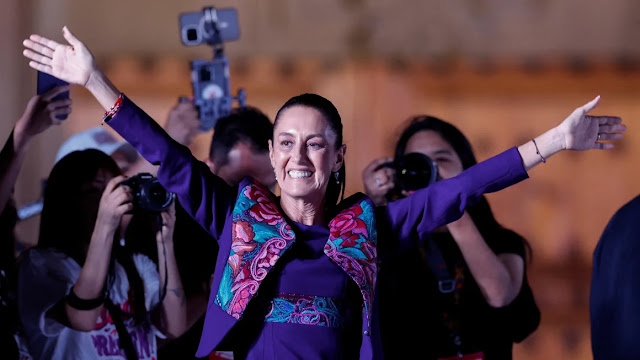Mexico elects Claudia Sheinbaum as its first female president
Claudia Sheinbaum is a prominent Mexican politician and scientist, known for her significant role in the country's political scene. Here are some important details about it:
1.Early Life and Education: Claudia Sheinbaum was born on June 24, 1962 in Mexico City. He received his higher education at the National Autonomous University of Mexico (UNAM), where he received a bachelor's degree in physics. Later he received his Ph.D. in Energy Engineering
2. Scientific Career: Before entering politics, Scheinbaum had a distinguished career as a scientist. She has published numerous research papers and has been involved in various environmental projects focusing on sustainable development and climate change.
3. Political Career:
Early Involvement: Sheinbaum began his political career as a member of the Party of the Democratic Revolution (PRD). He served as an adviser on environmental issues during Andrés Manuel López Obrador's tenure as mayor of Mexico City.
Secretary of the Environment: From 2000 to 2006, he served as Secretary of the Environment in Mexico City, where he worked on projects to reduce pollution and promote sustainable urban development.
Mayor of Mexico City: In 2018, Sheinbaum was elected head of government (mayor) of Mexico City, becoming the first woman to hold the position. His tenure focused on improving public transportation, reducing crime, and addressing environmental issues.
4. Presidential Candidate: Sheinbaum is a member of the National Regeneration Movement (MORENA), the political party founded by López Obrador. As of 2024, she is the party's candidate for the presidency, and if elected, would become Mexico's first female president.
5. Political Ideas: Claudia Sheinbaum is known for her progressive stance on a variety of issues including social justice, environmental sustainability, and gender equality. His policies often aligned with MORENA's broader leftist agenda, emphasizing welfare programs, economic equality, and public investment in infrastructure.
Scheinbaum's potential presidency is seen as a continuation of López Obrador's policies, which emphasize addressing social inequality and promoting sustainable development. His scientific background also influences his approach to policymaking, particularly in areas related to environmental protection and climate change.



Comments
Post a Comment